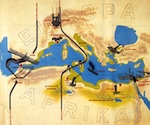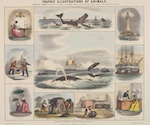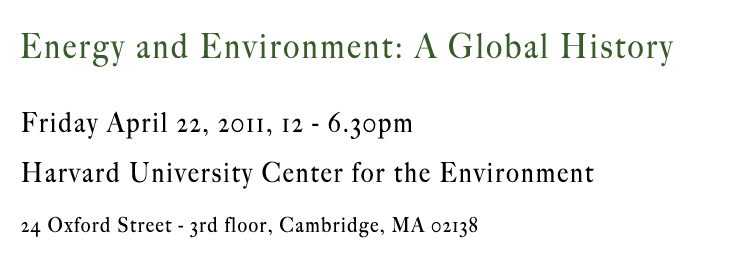Faculty Participants
David Blackbourn (Harvard)
Alison Frank (Harvard)
Richard Hornbeck (Harvard)
Christopher Jones (HUCE)
Ian Miller (Harvard)
Harriet Ritvo (MIT)
Emma Rothschild (Harvard)
Ling Zhang (HUCE)
Student Participants
![]() Jakobina Arch (jarch [at] fas.harvard.edu ) is a PhD candidate in the History and East Asian Languages program in the Department of East Asian Languages and Civilizations, specializing in the history of whales and whaling in early modern Japan. In her dissertation, tentatively titled "Rendering Whales: Science, Enterprise, and Imagination in Early Modern Japan, 1600-1900", she will consider a variety of intersections between whales, humans and their affiliated species. More broadly, she is interested in extending the focus of environmental history from terrestrial to marine environments, looking at the ways in which the marine environment and its products are closely tied to life ashore.
Jakobina Arch (jarch [at] fas.harvard.edu ) is a PhD candidate in the History and East Asian Languages program in the Department of East Asian Languages and Civilizations, specializing in the history of whales and whaling in early modern Japan. In her dissertation, tentatively titled "Rendering Whales: Science, Enterprise, and Imagination in Early Modern Japan, 1600-1900", she will consider a variety of intersections between whales, humans and their affiliated species. More broadly, she is interested in extending the focus of environmental history from terrestrial to marine environments, looking at the ways in which the marine environment and its products are closely tied to life ashore.
![]() John Lee (johnlee [at] fas.harvard.edu) is a graduate student in the History and East Asian Languages Ph.D. program in the Department of East Asian Languages and Civilizations, specializing in the environmental history of eighteenth and nineteenth-century Korea. John is also broadly interested in the problem of forest controls and deforestation in the pre-industrial world, with particular emphasis on early modern conflicts between governmental forestry projects and more localized patterns of wood use for fuel and agriculture.
John Lee (johnlee [at] fas.harvard.edu) is a graduate student in the History and East Asian Languages Ph.D. program in the Department of East Asian Languages and Civilizations, specializing in the environmental history of eighteenth and nineteenth-century Korea. John is also broadly interested in the problem of forest controls and deforestation in the pre-industrial world, with particular emphasis on early modern conflicts between governmental forestry projects and more localized patterns of wood use for fuel and agriculture.
![]() Philipp Lehmann (plehmann [at] fas.harvard.edu) Philipp Lehmann is a PhD candidate in the History Department. He works on scientific ideas of climate change and desertification and their relation to projects of environmental transformation in the late nineteenth and early twentieth century. His research focuses specifically on the intellectual context of large engineering schemes to transform desert environments into arable land, such as Francois Roudaire's project of the "Sahara Sea" and Herman Sorgel's vision of Atlantropa, a geo-engineered new Euro-African continent.
Philipp Lehmann (plehmann [at] fas.harvard.edu) Philipp Lehmann is a PhD candidate in the History Department. He works on scientific ideas of climate change and desertification and their relation to projects of environmental transformation in the late nineteenth and early twentieth century. His research focuses specifically on the intellectual context of large engineering schemes to transform desert environments into arable land, such as Francois Roudaire's project of the "Sahara Sea" and Herman Sorgel's vision of Atlantropa, a geo-engineered new Euro-African continent.
![]() Shi-Lin Loh (shiloh [at] fas.harvard.edu ) Shi-Lin Loh is a PhD candidate in the program on History and East Asian Languages. She specializes in nineteenth and twentieth-century Japanese and Chinese history, with particular regard to commemorations and contestations the Asia-Pacific war in both societies. Currently she is co-authoring an article on a comparative and transnational history of nuclear discourse in Japan, China and Russia from 1945 to 1960.
Shi-Lin Loh (shiloh [at] fas.harvard.edu ) Shi-Lin Loh is a PhD candidate in the program on History and East Asian Languages. She specializes in nineteenth and twentieth-century Japanese and Chinese history, with particular regard to commemorations and contestations the Asia-Pacific war in both societies. Currently she is co-authoring an article on a comparative and transnational history of nuclear discourse in Japan, China and Russia from 1945 to 1960.
![]() Victor Seow (seow [at] fas.harvard.edu) is a graduate student in History and East Asian Languages. His dissertation is a study of energy, and of how it made and maintained empire. Tentatively titled "Coal Capital: Japan's Empire of Energy in Northeast China, 1907-1957," this project focuses on Japan's imperial experiment in the region commonly referred to as Manchuria, and sets out to show the centrality of fossil fuel extraction and consumption to the functioning of the Japanese colonial apparatus.
Victor Seow (seow [at] fas.harvard.edu) is a graduate student in History and East Asian Languages. His dissertation is a study of energy, and of how it made and maintained empire. Tentatively titled "Coal Capital: Japan's Empire of Energy in Northeast China, 1907-1957," this project focuses on Japan's imperial experiment in the region commonly referred to as Manchuria, and sets out to show the centrality of fossil fuel extraction and consumption to the functioning of the Japanese colonial apparatus.
![]() David Singerman (singsing [at] mit.edu) studies the history of late-nineteenth-century science at MIT's Program in Science, Technology, and Society. He comes to environmental history through the prospective thesis topic of the global sugar trade. In particular, he is interested in how commodification, chemical supervision, and purity standards on the world market transformed the landscape of cane-sugar colonies, as huge, foreign-financed central factories overwhelmed older and much smaller plantations. David's other projects include the connections between the physical and social sciences during this period in the U.S., the "medicalization" of professional bicycle racing, and John Maynard Keynes's eugenics.
David Singerman (singsing [at] mit.edu) studies the history of late-nineteenth-century science at MIT's Program in Science, Technology, and Society. He comes to environmental history through the prospective thesis topic of the global sugar trade. In particular, he is interested in how commodification, chemical supervision, and purity standards on the world market transformed the landscape of cane-sugar colonies, as huge, foreign-financed central factories overwhelmed older and much smaller plantations. David's other projects include the connections between the physical and social sciences during this period in the U.S., the "medicalization" of professional bicycle racing, and John Maynard Keynes's eugenics.
![]() Joshua Specht (jspecht [at] fas.harvard.edu) Josh's interests in environmental history include the rise of large-scale livestock farming in the 19th century United States, the commodification of animals, and urban wildlife. He is currently developing a dissertation prospectus on the consolidation of a national ranching and meat packing industry in the United States. His project will take an ecological approach, emphasizing the evolving relationships between people, animals, and the land. A focus on energy and its transformations is key to conceptualizing these interconnections.
Joshua Specht (jspecht [at] fas.harvard.edu) Josh's interests in environmental history include the rise of large-scale livestock farming in the 19th century United States, the commodification of animals, and urban wildlife. He is currently developing a dissertation prospectus on the consolidation of a national ranching and meat packing industry in the United States. His project will take an ecological approach, emphasizing the evolving relationships between people, animals, and the land. A focus on energy and its transformations is key to conceptualizing these interconnections.
![]() Rebecca Woods (rjwood [at] mit.edu) is writing a dissertation on the global diaspora of British breeds of livestock in the late nineteenth century. A PhD candidate in History, Anthropology, and Science, Technology and Society at MIT, her work explores the cultural and physiological transformations of British breeds transposed to unfamiliar colonial environments. She is particularly interested in the changing fortunes of breeds over time, and how cultural, economic, and environmental imperatives are at play in the global transfer of stock, both historically and in present efforts to conserve rare or endangered breeds of livestock as an alternative to commercially-dominant cattle and sheep breeds.
Rebecca Woods (rjwood [at] mit.edu) is writing a dissertation on the global diaspora of British breeds of livestock in the late nineteenth century. A PhD candidate in History, Anthropology, and Science, Technology and Society at MIT, her work explores the cultural and physiological transformations of British breeds transposed to unfamiliar colonial environments. She is particularly interested in the changing fortunes of breeds over time, and how cultural, economic, and environmental imperatives are at play in the global transfer of stock, both historically and in present efforts to conserve rare or endangered breeds of livestock as an alternative to commercially-dominant cattle and sheep breeds.
![]() Jeremy Zallen (jzallen [at] fas.harvard.edu) Jeremy is a third-year graduate student in History beginning his dissertation on the history of artificial lights in North America. By framing his analysis around work, energy, space, and environment, he plans to widen the story beyond invention and technology to bring the production, commodification, and consumption of lights under one narrative. From pre-Columbian lightways, whalers, urban reformers, candle-makers, miners, gas works, electrical workers, and more, Jeremy plans to explore the contested relationships and tensions built, maintained, and broken in the making and consuming of light.
Jeremy Zallen (jzallen [at] fas.harvard.edu) Jeremy is a third-year graduate student in History beginning his dissertation on the history of artificial lights in North America. By framing his analysis around work, energy, space, and environment, he plans to widen the story beyond invention and technology to bring the production, commodification, and consumption of lights under one narrative. From pre-Columbian lightways, whalers, urban reformers, candle-makers, miners, gas works, electrical workers, and more, Jeremy plans to explore the contested relationships and tensions built, maintained, and broken in the making and consuming of light.





